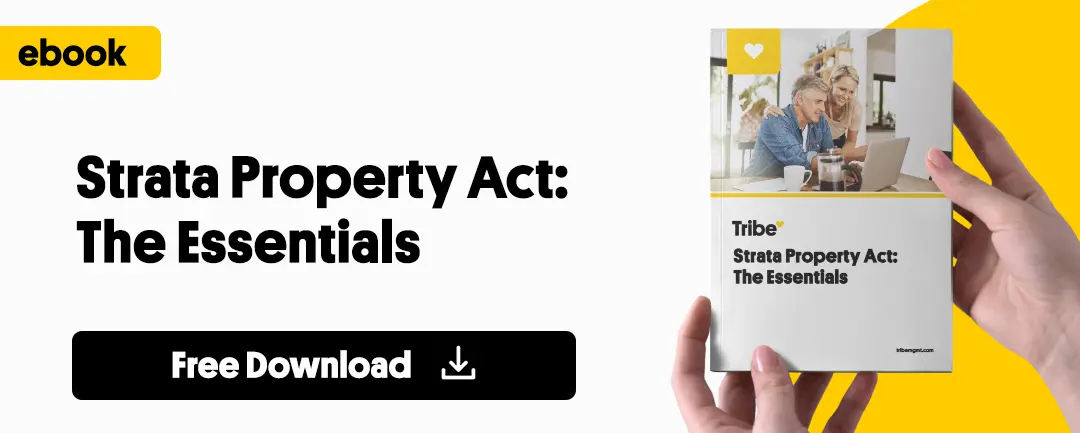
Strata Property Act: The Essentials
The Strata Property Act, along with a strata’s bylaws and rules, provides the legal framework under which all Strata Corporations must operate in British Columbia. Even though Stratas are self-governed, strata owners and residents must use the legislative framework to inform their actions and rules.
Inspire Someone Today – Share This!
Being part of a Strata Council can be a fulfilling experience, but when difficult questions arise regarding the Strata Corporation, where do you turn to for answers? The answer is simple! You open the BC Strata Property Act, and there you can view the entire legal framework under which all Strata Corporations must abide in British Columbia.
We are going to forewarn you...this document is not the most riveting piece of literature you will read. Still, it is indeed one of the most informative documents you will ever read about the Strata Legislature in BC.
After reading this post, you will feel more empowered than ever about your knowledge of Strata rules within BC.
BONUS: The team at Tribe Management is busy working on material to break barriers around the understanding of BC Legislation pertaining to Condo Corporations. Stay tuned!
What is the Strata Property Act?
As mentioned previously, the Strata Property Act outlines the regulations surrounding Strata Corporations under which all must operate in BC.
It is worth noting that the Strata Property Act is not just a set of guidelines suggesting how you should run your Community, but rather, it is a mandated legal act that governs Strata Corporations across BC.
Strata Property Act Regulations
The Strata Property Act is a comprehensive provincial document that is made up of 17 parts and broken down into 322 sections. This document is hundreds of pages long because its purpose is to clarify strata-related issues.
Whether you are curious about Council voting, contingency reserve funds and everything in between, this document will lead you in the right direction.
Below is a hyperlinked list of every Strata Property Act regulation or section for easy reference:
Strata Property Act Standard Bylaws
In BC, every Strata Corporation is required to have a set of bylaws. If a developer or community has not filed their own set of bylaws, the “default” bylaws, called the Strata Property Act Standard Bylaws, govern the community. The Standard Bylaws can be found attached to the Strata Property Act as a schedule.
As the Standard Bylaws are just that, standard, many communities opt to make changes to the bylaws or adopt a whole new set to better reflect their shared values and lifestyle.
A community’s bylaws can be changed through one of the following methods:
- The filing of a different set of bylaws by the owner developer of the community with Land Titles.
- A unanimous vote of approval by Owners prior to a community’s second Annual General Meeting (AGM).
- A ¾ vote of approval by Owners after a community’s second AGM.
Bylaw amendments commonly address areas like pets, unit alterations, and more recently EV charging.
As part of our Strata 101 series, we’ve created an in-depth overview of Strata Bylaws in BC including how they are amended, enforced, and the difference between bylaws and rules.
Who does the Strata Property Act affect?
All Strata Corporations must abide by the Strata Property Act; this includes owners, tenants, Strata Council members and those living in the Community. In essence, the Strata Property Act affects all individuals that make up a Community.
Who is responsible for enforcing the Strata Property Act?
The Strata Council is responsible for enforcing the regulations and Community bylaws. In many cases, when a Strata Council enforces regulations, this can be done via email, call or a conversation between the parties involved. However, there are times enforcement can include fining owners and tenants.
As you can see, the Strata Property Act affects all parties who live in a Community. However, only some of those who live in the Community may enforce the regulations and bylaws.
We are on a mission to educate and connect Strata Councils and owners across BC. We’ve extensively researched the characteristics of a successful Strata Council to determine a balanced yet collaborative relationship between a Council and its Community.
Be sure to read and share the article above. Perhaps your Strata Council may not need to enforce any regulations after this. 😉
If you have questions about the Strata Property Act, you can reach out to your Property Manager (or, as we call them at Tribe, Community Managers); this person is knowledgeable and licensed to answer questions specific to the Strata Property Act. However, if they cannot answer a question, they will direct you to a lawyer specializing in Property Management law.
Bonus: If you live in a Tribe Community, your agency agreement may include a legal retainer. Please get in touch with your Community Manager to learn more.
New & Upcoming Changes to the Strata Property Act Regulations
Amendments to the Strata Property Act and Regulations are regularly considered by the BC government based on feedback from the strata community & stakeholders. To assist Strata Councils in keeping up to date with amendments, we’ve prepared a list of Strata Property Act changes for easy reference below:
New Changes
- Strata Property Act Regulation 6.21- Strata Depreciation Report Requirements - The Province updated depreciation report requirements through Order-in-Council 204-2024. Some of the changes to take effect July 1, 2024 include:
-
- Strata Corporations with 5 or more lots must obtain a depreciation report on a five-year cycle. Time has been allowed for Strata Corporations to obtain the required reports depending on geographical location.
- Strata Corporations may no longer defer getting a depreciation report by holding an annual 3/4 vote.
- Detailed information of who may complete a depreciation report and what content it must include.
-
In addition to the above changes, as of July 1, 2027, the Regulations also outline the funding owner developers will be required to provide towards the first depreciation report for new Strata Corporation.
- Stata Property Act Regulation 6.1 - Contingency Reserve Fund - The amount of the annual contribution to a Strata’s contingency reserve fund (CRF) must be no less than 10% of the total amount budgeted for contributions to the operating fund. (Order in Council 0032-2023, effective November 1, 2023).
- Strata Property Act Regulations 71, 82, & 96 - Changes to Support Electric Vehicle Charging - To make it easier for Strata Corporation's to approve and install electric vehicle (EV) charging, the voting threshold has been lowered from a 3/4 vote to a majority vote for approvals relating to EV framework installation, operation, & maintenance. (Bill 22, effective May 11, 2023).
-
- Further to Bill 22, Order-in-Council 671-23 brought into effect further changes by regulation on December 6, 2023 including:
-
- Requirements for certain Strata Corporations to obtain electrical planning reports.
- Specifications on the details that must be included in an Owner's request to install a charge, or other EV charging infrastructure along with conditions and criteria that a Strata Council may consider when reviewing a request.
- The time a Strata Corporation may grant permission to exclusively use a parking stall that is common property when EV charging has been installed and paid for by an Owner.
-
- Further to Bill 22, Order-in-Council 671-23 brought into effect further changes by regulation on December 6, 2023 including:
-
- Strata Property Act Regulation 141 Rental Restriction - No Strata Corporation is permitted to restrict residential rentals. Any bylaw restricting residential rental is no longer enforceable. A Strata Corporation may still have or choose to create a bylaw restricting short-term rentals. (Bill 44, effective November 24, 2022)
- Strata Property Act Regulations 123.1 & 123.2 Age Restrictions - A Strata Corporation Bylaw which sets out a minimum age of less than 55 years is no longer valid. A bylaw which restricts ages to 55 years and older remains valid. (Bill 44, effective November 24, 2022, Updated May 1, 2023)
-
-
- Additional Exemptions to Strata Age-Restrictions Bylaws Update
- Amended Legacy Exemption – A legacy exemption which applies to an Owner, tenant, or Occupant also applies to their partner, spouse, or children (regardless of the child’s age) at any point after an age restriction bylaw is passed.
- Child Exemption - A Resident may have their child of any age live with them in a 55+ age-restricted Strata Corporation.
- Spouse/Partner Exemption – A Resident may have a younger spouse or partner live with them in a 55+ age-restricted Strata Corporation. Partners are not required to cohabitate for a certain amount of time before living together in a 55+ age-restricted strata.
- Additional Exemptions to Strata Age-Restrictions Bylaws Update
-
-
- Strata Property Act Regulation 49 Electronic Meetings – Strata Corporations don’t require a bylaw in place to conduct their Annual General Meeting (AGM) by electronic means (such as by telephone or video conferencing). (Bill 44, effective November 24, 2022)
- Strata Property Regulation Section 59 Form B: Information Certificate - Strata Corporations are required to include a summary of insurance coverage when issuing a Form B. (Effective April 1, 2023)
Strata Property Act FAQs
The team at Tribe asked our Community Managers what the most common questions are that come their way regarding the Strata Property Act; here is what they had to say!
How do you vote as a Strata Council?
When members of a Community first join a Strata Council, typically, their first question is, “How do we vote during our meetings?” If only there was a body of writing that could outline the regulations of voting within a Strata Council... oh wait, there is!
Any vote that a Strata Council wants to pass must be met with a majority vote, meaning more than 50%. If there is a tie vote, the President will break it with their vote.
Did you know?
Tribe’s in-house community platform, Tribe Home, has a Council Voting feature that provides a seamless experience for Council Members to vote on important issues quickly and efficiently with the click of a button.
.png?width=500&height=314&name=Tribe%20Home%20Product%20Mockup_Laptop%20%26%20Phone_2022_Council%20Voting%201%20(1).png)
Benefits of this feature include:
- Clarity - No more sifting through emails to track whether a decision was made. Receive a report with a clear-cut resolution.
- Action - Support decision-making in between meetings, allowing the Council and Community Manager to make progress on work.
- Record - Pull reports on decisions made, showing who participated and how many people voted.
Council Voting meets BC requirements for recorded decisions by posting a minuted report to owners following a vote.
How much do we add to the contingency fund?
Firstly, let's take a step back. Each Community has its own operating budget to pay for common expenses that maintain the building or occur regularly. The contingency fund is a reserve of money to cover unforeseen expenses, such as fixing a roof due to mould.
The amount you add to the contingency is dictated by the Strata Property Act, as you can now imagine. Currently, the contingency fund must have a balance equal to at least 25% of the current operating budget. However, this will be changing due to a recent amendment to the Act. Effective November 1st, 2023, strata corporations will be required to commit a minimum of 10% of their annual operating budget to the contingency fund.
Note from our Community Managers: "You can never have enough in the contingency fund; if you can spare more to the contingency fund, do so. You never know when an unforeseen event will occur, and when they do, it can be a very hefty price tag."
What is Common Property, Limited Common Property and Strata Lot?
There are so many terms and definitions when it comes to the Strata Property Act it can be easy to get them mixed up. Our Community Managers are often asked about the difference between Common Property, Limited Common Property and Strata Lots! Let’s dive into it.
Common Property
Common property is any part of the land and buildings shown on the strata plan that is not part of a strata lot (refer to Strata Lot for definition). For example, in a Community, common property typically includes hallways, elevators, recreational amenities and building exteriors such as the roof.
Limited Common Property
Limited common property is a common property that has been designated on the strata plan for the exclusive use of one or more strata lots. For example, balconies and parking spaces may be defined as limited common property.
Strata Lot
A strata lot is owned individually by the owner(s) and is often referred to as a strata unit. In condominiums and townhouses, the strata lot usually ends at the centre of the walls, floors and ceilings but may have different boundaries if shown on the strata plan.
Additional Legislation
Yes, the Strata Property Act is a very useful document when uncovering information as part of a Strata Council. However, you should be aware of several other supporting pieces of legislation in BC.
This Act improves the quality of residential construction and strengthens consumer protection for buyers of new homes.
The Humans Rights Code prohibits discrimination in specific areas of activity and outlines the process for making and resolving complaints of discrimination.
The Personal Information Protection Act (PIPA)
PIPA aims to address privacy issues and concerns in the private sector, including Strata Corporations.
The Real Estate Services Act (RESA)
RESA provides a licensing and regulatory framework for Community Managers and Realtors. It is regulated by the Superintendent of Real Estate and the Real Estate Council of British Columbia.
The Residential Tenancy Act (RTA)
This Provincial act governs the relationships between Landlords and Tenants across BC.
Conclusion
The Strata Property Act of BC was designed to help Strata Council members understand their provincial rights and responsibilities. Yes, it would be impossible to memorize the entire Act as it contains a myriad of Strata Property regulation information.
However, with the help of supportive blog content such as this one, we can break down barriers and simplify Community living. This is how we provide Community Management with Heart 💛
Knowledge is Power - Share Today!






![3 Common Issues Condo Boards In Alberta Face [+How to Solve Them]](https://4820309.fs1.hubspotusercontent-na1.net/hub/4820309/hubfs/Tribe2022/blog/Common-issues-strata-council-face-min.jpeg?width=352&name=Common-issues-strata-council-face-min.jpeg)